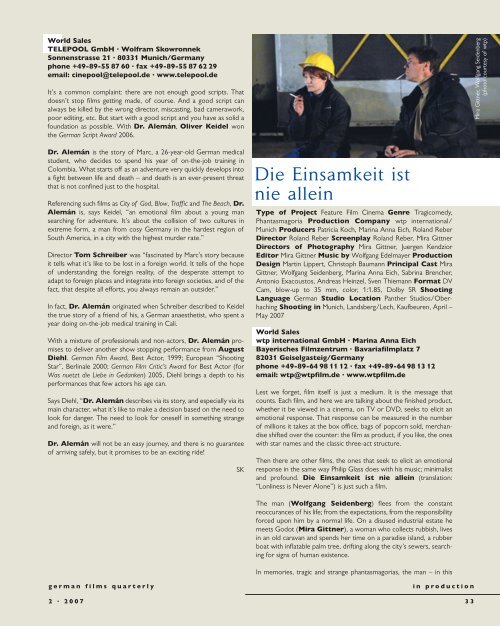GFQ 2-2007 - german films
GFQ 2-2007 - german films
GFQ 2-2007 - german films
You also want an ePaper? Increase the reach of your titles
YUMPU automatically turns print PDFs into web optimized ePapers that Google loves.
World Sales<br />
TELEPOOL GmbH · Wolfram Skowronnek<br />
Sonnenstrasse 21 · 80331 Munich/Germany<br />
phone +49-89-55 87 60 · fax +49-89-55 87 62 29<br />
email: cinepool@telepool.de · www.telepool.de<br />
It’s a common complaint: there are not enough good scripts. That<br />
doesn’t stop <strong>films</strong> getting made, of course. And a good script can<br />
always be killed by the wrong director, miscasting, bad camerawork,<br />
poor editing, etc. But start with a good script and you have as solid a<br />
foundation as possible. With Dr. Alemán, Oliver Keidel won<br />
the German Script Award 2006.<br />
Dr. Alemán is the story of Marc, a 26-year-old German medical<br />
student, who decides to spend his year of on-the-job training in<br />
Colombia. What starts off as an adventure very quickly develops into<br />
a fight between life and death – and death is an ever-present threat<br />
that is not confined just to the hospital.<br />
Referencing such <strong>films</strong> as City of God, Blow, Traffic and The Beach, Dr.<br />
Alemán is, says Keidel, “an emotional film about a young man<br />
search ing for adventure. It’s about the collision of two cultures in<br />
extreme form, a man from cosy Germany in the hardest region of<br />
South America, in a city with the highest murder rate.”<br />
Director Tom Schreiber was “fascinated by Marc’s story because<br />
it tells what it’s like to be lost in a foreign world. It tells of the hope<br />
of understanding the foreign reality, of the desperate attempt to<br />
adapt to foreign places and integrate into foreign societies, and of the<br />
fact, that despite all efforts, you always remain an outsider.”<br />
In fact, Dr. Alemán originated when Schreiber described to Keidel<br />
the true story of a friend of his, a German anaesthetist, who spent a<br />
year doing on-the-job medical training in Cali.<br />
With a mixture of professionals and non-actors, Dr. Alemán promises<br />
to deliver another show stopping performance from August<br />
Diehl. German Film Award, Best Actor, 1999; European “Shooting<br />
Star”, Berlinale 2000; German Film Critic’s Award for Best Actor (for<br />
Was nuetzt die Liebe in Gedanken) 2005, Diehl brings a depth to his<br />
performances that few actors his age can.<br />
Says Diehl, “Dr. Alemán describes via its story, and especially via its<br />
main character, what it’s like to make a decision based on the need to<br />
look for danger. The need to look for oneself in something strange<br />
and foreign, as it were.”<br />
Dr. Alemán will not be an easy journey, and there is no guaran tee<br />
of arriving safely, but it promises to be an exciting ride!<br />
SK<br />
Die Einsamkeit ist<br />
nie allein<br />
Type of Project Feature Film Cinema Genre Tragicomedy,<br />
Phantasmagoria Production Company wtp international/<br />
Munich Producers Patricia Koch, Marina Anna Eich, Roland Reber<br />
Director Roland Reber Screenplay Roland Reber, Mira Gittner<br />
Directors of Photography Mira Gittner, Juergen Kendzior<br />
Editor Mira Gittner Music by Wolfgang Edelmayer Production<br />
Design Martin Lippert, Christoph Baumann Principal Cast Mira<br />
Gittner, Wolfgang Seidenberg, Marina Anna Eich, Sabrina Brencher,<br />
Antonio Exacoustos, Andreas Heinzel, Sven Thiemann Format DV<br />
Cam, blow-up to 35 mm, color, 1:1.85, Dolby SR Shooting<br />
Language German Studio Location Panther Studios/Ober -<br />
haching Shooting in Munich, Landsberg/Lech, Kaufbeuren, April –<br />
May <strong>2007</strong><br />
World Sales<br />
wtp international GmbH · Marina Anna Eich<br />
Bayerisches Filmzentrum · Bavariafilmplatz 7<br />
82031 Geiselgasteig/Germany<br />
phone +49-89-64 98 11 12 · fax +49-89-64 98 13 12<br />
email: wtp@wtpfilm.de · www.wtpfilm.de<br />
Lest we forget, film itself is just a medium. It is the message that<br />
counts. Each film, and here we are talking about the finished product,<br />
whether it be viewed in a cinema, on TV or DVD, seeks to elicit an<br />
emotional response. That response can be measured in the number<br />
of millions it takes at the box office, bags of popcorn sold, merchandise<br />
shifted over the counter: the film as product, if you like, the ones<br />
with star names and the classic three-act structure.<br />
Then there are other <strong>films</strong>, the ones that seek to elicit an emotional<br />
response in the same way Philip Glass does with his music; minimalist<br />
and profound. Die Einsamkeit ist nie allein (translation:<br />
“Lonli ness is Never Alone”) is just such a film.<br />
The man (Wolfgang Seidenberg) flees from the constant<br />
reoccuranc es of his life; from the expectations, from the respon sibility<br />
forced upon him by a normal life. On a disused industrial estate he<br />
meets Godot (Mira Gittner), a woman who collects rubbish, lives<br />
in an old caravan and spends her time on a paradise island, a rubber<br />
boat with inflatable palm tree, drifting along the city’s sewers, search -<br />
ing for signs of human existence.<br />
In memories, tragic and strange phantasmagorias, the man – in this<br />
<strong>german</strong> <strong>films</strong> quarterly in production<br />
2 · <strong>2007</strong> 33<br />
Mira Gittner, Wolfgang Seidenberg<br />
(photo courtesy of wtp)

















